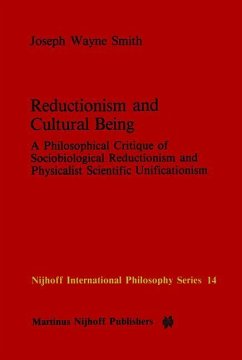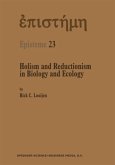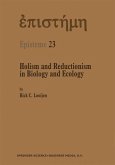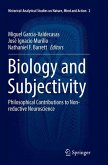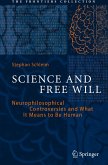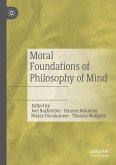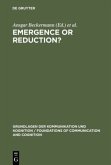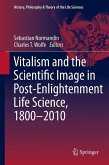J. W. Smith
Reductionism and Cultural Being
A Philosophical Critique of Sociobiological Reductionism and Physicalist Scientific Unificationism
J. W. Smith
Reductionism and Cultural Being
A Philosophical Critique of Sociobiological Reductionism and Physicalist Scientific Unificationism
- Gebundenes Buch
Andere Kunden interessierten sich auch für
![Holism and Reductionism in Biology and Ecology Holism and Reductionism in Biology and Ecology]() Rick C. LooijenHolism and Reductionism in Biology and Ecology121,99 €
Rick C. LooijenHolism and Reductionism in Biology and Ecology121,99 €![Holism and Reductionism in Biology and Ecology Holism and Reductionism in Biology and Ecology]() Rick C. LooijenHolism and Reductionism in Biology and Ecology116,99 €
Rick C. LooijenHolism and Reductionism in Biology and Ecology116,99 €![Biology and Subjectivity Biology and Subjectivity]() Biology and Subjectivity39,99 €
Biology and Subjectivity39,99 €![Science and Free Will Science and Free Will]() Stephan SchleimScience and Free Will39,99 €
Stephan SchleimScience and Free Will39,99 €![Moral Foundations of Philosophy of Mind Moral Foundations of Philosophy of Mind]() Moral Foundations of Philosophy of Mind85,99 €
Moral Foundations of Philosophy of Mind85,99 €![Emergence or Reduction? Emergence or Reduction?]() Emergence or Reduction?129,99 €
Emergence or Reduction?129,99 €![Vitalism and the Scientific Image in Post-Enlightenment Life Science, 1800-2010 Vitalism and the Scientific Image in Post-Enlightenment Life Science, 1800-2010]() Vitalism and the Scientific Image in Post-Enlightenment Life Science, 1800-2010131,99 €
Vitalism and the Scientific Image in Post-Enlightenment Life Science, 1800-2010131,99 €-
-
-
Produktdetails
- Nijhoff International Philosophy Series 14
- Verlag: Springer / Springer Netherlands
- Artikelnr. des Verlages: 978-90-247-2884-8
- 1984.
- Seitenzahl: 404
- Erscheinungstermin: 31. Mai 1984
- Englisch
- Abmessung: 241mm x 160mm x 27mm
- Gewicht: 744g
- ISBN-13: 9789024728848
- ISBN-10: 9024728843
- Artikelnr.: 23067402
Hinweis: Dieser Artikel kann nur an eine deutsche Lieferadresse ausgeliefert werden.
- Herstellerkennzeichnung Die Herstellerinformationen sind derzeit nicht verfügbar.
1 Statement of the argument: Philosophical orientation and the theoretical framework for critique.- 1 Introduction: The statement of the overall argument.- 2 Rebuttal of the methodological criticism of the argumentative structure of the work.- 2 Philosophico-methodological reductionism: The alleged case against Culturology.- 1 Introductory statement of the argument: Culturology and the idea of a philosophico-methodological reduction.- 2 Systematizing the critique.- 3 Monistic-Systemic Perspectivism and the "crisis of Sociology".- 4 A response to the Ellis-Skinner critique of the fundamental assumption of Culturology.- 5 Conclusion: The state of the argument.- 3 Theoretical reductionism and physicalist scientific unificationism: The case against.- 1 Introductory statement of the argument.- 2 The Weltanschauung of Physicalist Scientific Unificationism.- 3 Systematizing the argument: Sociobiology and PSU.- 4 Culturology, sociobiology and theoretical reduction.- 5 Unification without reduction; Philosophy without physicalism.- 6 Conclusion: The state of the argument.- 4 Causal-explanatory reductionism I: A philosophico-biological critique of Sociobiology.- 1 Introductory state of the argument.- 2 The theoretical foundations of the neo-Darwinist synthesis and an explanation of the theoretical structure of sociobiology.- 3 Towards a critique of Sociobiology.- 4 Conclusion: The state of the argument.- 5 Causal-explanatory reductionism II: The metaphysics of the selfish gene.- 1 Introductory state of the argument.- 2 The nature of the gene: Mendelian genetics, quantitative genetics and molecular biology.- 3 Beyond neo-Darwinism: The search for a new science of life.- 4 Conclusion: The state of the argument.- 6 Causal-explanatory reductionism III: Neuroendocrinologicalreductionism and the rationality of the foundations of feminist social theory.- 1 Introductory state of the argument.- 2 Initial outline of the (NECER) positions.- 3 The conceptual and biological background.- 4 A critique of the positions.- 5 Scepticism about sex-related cognitive differences.- 6 General conclusion: The state of the argument.- 7 Causal-explanatory reductionism IV: Ecological Sociobiology and cultural materialism.- 1 Introductory statement of the argument.- 2 Central theoretical presuppositions of Emlen's Ecological Sociobiology.- 3 A critique of Ecological Sociobiology.- 4 Harris' cultural materialism: An exposition.- 5 The case against Cultural Materialism.- 6 Conclusion: The state of the argument.- 8 Reductionism and cultural being: Beings, agents, mentalities, persons and societies in the universe.- 1 Introductory state of the argument.- 2 Culturology and models of human nature.- 3 Culturology, innateness and the human essence.- 4 Culturology defined and defended: Beings, agents, mentalities, persons and societies in the universe.- 5 Conclusion: The state of the argument.- Conclusion: The state of the overall argument of the work.- Appendix 1: Sociobiology and ideology.- Appendix 2: A critique of Alexander Rosenberg's Sociobiology and the preemption of social science.- Notes.
1 Statement of the argument: Philosophical orientation and the theoretical framework for critique.- 1 Introduction: The statement of the overall argument.- 2 Rebuttal of the methodological criticism of the argumentative structure of the work.- 2 Philosophico-methodological reductionism: The alleged case against Culturology.- 1 Introductory statement of the argument: Culturology and the idea of a philosophico-methodological reduction.- 2 Systematizing the critique.- 3 Monistic-Systemic Perspectivism and the "crisis of Sociology".- 4 A response to the Ellis-Skinner critique of the fundamental assumption of Culturology.- 5 Conclusion: The state of the argument.- 3 Theoretical reductionism and physicalist scientific unificationism: The case against.- 1 Introductory statement of the argument.- 2 The Weltanschauung of Physicalist Scientific Unificationism.- 3 Systematizing the argument: Sociobiology and PSU.- 4 Culturology, sociobiology and theoretical reduction.- 5 Unification without reduction; Philosophy without physicalism.- 6 Conclusion: The state of the argument.- 4 Causal-explanatory reductionism I: A philosophico-biological critique of Sociobiology.- 1 Introductory state of the argument.- 2 The theoretical foundations of the neo-Darwinist synthesis and an explanation of the theoretical structure of sociobiology.- 3 Towards a critique of Sociobiology.- 4 Conclusion: The state of the argument.- 5 Causal-explanatory reductionism II: The metaphysics of the selfish gene.- 1 Introductory state of the argument.- 2 The nature of the gene: Mendelian genetics, quantitative genetics and molecular biology.- 3 Beyond neo-Darwinism: The search for a new science of life.- 4 Conclusion: The state of the argument.- 6 Causal-explanatory reductionism III: Neuroendocrinologicalreductionism and the rationality of the foundations of feminist social theory.- 1 Introductory state of the argument.- 2 Initial outline of the (NECER) positions.- 3 The conceptual and biological background.- 4 A critique of the positions.- 5 Scepticism about sex-related cognitive differences.- 6 General conclusion: The state of the argument.- 7 Causal-explanatory reductionism IV: Ecological Sociobiology and cultural materialism.- 1 Introductory statement of the argument.- 2 Central theoretical presuppositions of Emlen's Ecological Sociobiology.- 3 A critique of Ecological Sociobiology.- 4 Harris' cultural materialism: An exposition.- 5 The case against Cultural Materialism.- 6 Conclusion: The state of the argument.- 8 Reductionism and cultural being: Beings, agents, mentalities, persons and societies in the universe.- 1 Introductory state of the argument.- 2 Culturology and models of human nature.- 3 Culturology, innateness and the human essence.- 4 Culturology defined and defended: Beings, agents, mentalities, persons and societies in the universe.- 5 Conclusion: The state of the argument.- Conclusion: The state of the overall argument of the work.- Appendix 1: Sociobiology and ideology.- Appendix 2: A critique of Alexander Rosenberg's Sociobiology and the preemption of social science.- Notes.

